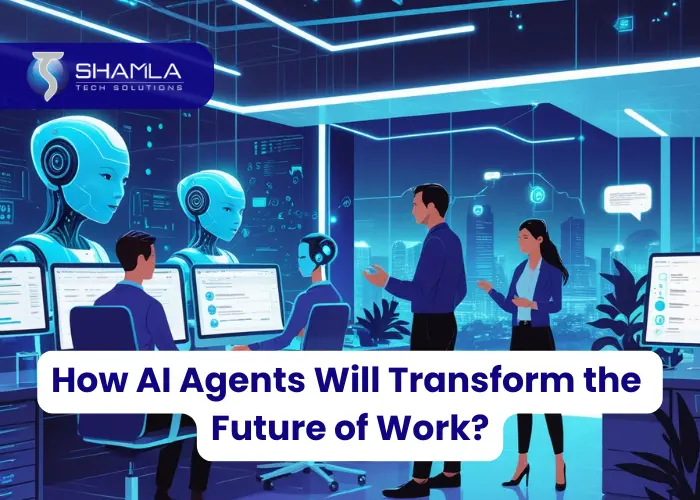The future of work is undergoing a radical shift, one that’s being powered by artificial intelligence. Among the most groundbreaking innovations in this space are AI agents—autonomous systems capable of learning, reasoning, and performing complex tasks with minimal human intervention. As organizations strive to streamline operations, enhance productivity, and personalize experiences, the role of AI agents becomes increasingly pivotal.
In this blog, we explore in depth how AI agents will transform the future of work, the role of AI agent development companies, and how businesses can harness these technologies through cutting-edge AI agent development solutions.
What Are AI Agents?
An AI agent is an intelligent entity programmed to perceive its environment, process information, make decisions, and take actions to achieve specific goals. These agents range from virtual assistants like Siri or Alexa to more complex agents that can manage customer support, automate data analysis, or optimize business workflows.
The evolution of AI agents marks a major leap from basic automation to intelligent decision-making systems. Fueled by advancements in machine learning, natural language processing, and neural networks, modern AI agents are more adaptive and capable than ever before.
How AI Agents Will Transform the Future of Work
Let’s break down exactly how AI agents are transforming workplaces across industries.
1. Automating Repetitive Tasks
AI agents excel at performing routine and repetitive tasks—data entry, scheduling, inventory tracking, etc.—at speeds and accuracies far beyond human capability. This reduces operational costs, eliminates errors, and frees up employees to focus on creative, strategic, and high-value work.
Example: An AI agent can handle hundreds of invoice entries in minutes, flagging anomalies without fatigue.
2. Enhancing Decision-Making
AI agents can analyze massive volumes of data in real time, identifying patterns, trends, and insights that humans might overlook. This empowers businesses to make faster, data-driven decisions with higher precision.
Use Case: In finance, AI agents analyze stock performance and market indicators to provide real-time investment advice.
3. Improving Customer Experiences
One of the most visible transformations is in customer service. AI chatbots and voice agents provide 24/7 assistance, understand customer queries, and resolve issues instantly. They also learn from interactions, making them smarter over time.
Result: Reduced wait times, increased customer satisfaction, and lower support costs.
4. Driving Personalization at Scale
AI agents collect and interpret user data to deliver personalized content, product recommendations, and experiences. Whether it’s in marketing, e-commerce, or education, this level of personalization was previously unimaginable at scale.
Example: Netflix’s AI agent curates content uniquely for each user based on viewing history and preferences.
5. Enhancing Collaboration and Productivity
AI agents act as smart collaborators—taking meeting notes, summarizing discussions, tracking tasks, and even suggesting next steps based on context.
Real-world Tools: Microsoft Copilot, Notion AI, and Slack GPT are prime examples of productivity-focused AI agents.
6. Revolutionizing Recruitment and HR
From screening resumes to scheduling interviews and predicting candidate success, AI agents are revolutionizing HR functions. They eliminate bias, streamline hiring, and improve employee engagement through intelligent chatbots and sentiment analysis tools.
7. Enabling Remote and Hybrid Work
AI agents assist remote teams by automating workflows, managing communication, and ensuring smooth project management. They serve as the bridge between distributed teams, ensuring efficiency and accountability.
8. Supporting Upskilling and Continuous Learning
AI agents personalize learning experiences for employees, identifying skill gaps and recommending training modules tailored to individual growth. This ensures a future-ready workforce.
AI Agent Development: Building the Future
The transformative power of AI agents lies not just in their intelligent functionality, but in the meticulous process behind their creation. AI agent development is the art and science of building autonomous systems that can perceive, reason, learn, and act in real-world environments. This involves a synergy of advanced technologies such as machine learning, natural language processing, computer vision, and reinforcement learning.
A successful AI agent begins with a clear objective—whether it’s customer support automation, data analysis, or intelligent task execution. From there, developers design the architecture, train models on relevant data, and fine-tune the agent to adapt to dynamic inputs. This process demands deep technical expertise and a strong understanding of the problem domain.
Partnering with an AI agent development company can streamline this journey. These firms offer end-to-end AI agent development solutions, from strategy and prototype design to deployment and continuous improvement. Their teams of skilled AI agent developers ensure the agents are scalable, secure, and seamlessly integrated into existing systems.
Ultimately, AI agent development is shaping the future of work—one intelligent interaction at a time. Organizations investing in these technologies today are setting the foundation for a smarter, faster, and more responsive tomorrow.
What is AI Agent Development?
AI agent development is the process of designing, training, and deploying autonomous systems capable of independent decision-making. It involves a blend of artificial intelligence, machine learning, data engineering, and UX design to create agents that understand, act, and learn within dynamic environments.
Whether it’s a conversational AI chatbot or a backend data processing agent, development requires a deep understanding of both technology and domain-specific requirements.
Role of an AI Agent Development Company
Choosing the right AI agent development company can make all the difference. These companies provide end-to-end services—from ideation and architecture to deployment and monitoring.
They bring: Custom AI agent development solutions tailored to your business. Access to skilled AI agent developers with experience in multi-agent systems, NLP, and ML. Scalability, integration support, and post-deployment training. Partnering with such companies empowers businesses to leapfrog traditional automation and build truly intelligent systems.
Why Businesses Are Investing in AI Agent Development Solutions
In an increasingly digital and fast-paced world, businesses are constantly on the lookout for solutions that enhance efficiency, drive innovation, and position them ahead of the competition. This quest has led to the growing adoption of AI agent development solutions—a transformative approach that’s redefining the way organizations operate across industries.
One of the primary motivators behind this shift is the competitive edge AI agents offer. Companies that implement intelligent agents early on are experiencing significant improvements in productivity, customer engagement, and operational speed. By automating complex tasks and decision-making processes, AI agents allow businesses to do more in less time—faster support, quicker resolutions, and smarter responses.
Scalability is another critical factor. Unlike human employees who are bound by time and capacity, AI agents can interact with thousands of users or processes simultaneously, 24/7. Whether it’s responding to customer inquiries, managing backend processes, or analyzing vast datasets, AI agents perform at scale without compromising accuracy or efficiency.
From a financial perspective, cost efficiency is a compelling advantage. AI agent development reduces the need for large manual workforces to handle repetitive or mundane tasks, leading to long-term savings and better resource allocation. Businesses can reassign human capital to higher-value, strategic functions that require creativity, emotional intelligence, and critical thinking.
Moreover, AI agents are revolutionizing data utilization. Most enterprises generate massive volumes of data but lack the tools to effectively harness it. AI agents can process, interpret, and act on this data in real time, offering insights and predictive recommendations that drive better decision-making across departments.
Finally, there’s the crucial aspect of future-proofing. As industries move towards automation and intelligent technologies, adopting AI agent development solutions ensures that companies remain agile and adaptive. These systems are built to evolve—learning from new data, adapting to emerging trends, and integrating seamlessly with other tech stacks.
Here are a few reasons why AI agent development solutions are being widely adopted across sectors:
- Competitive Edge: Early adopters of AI agents are already seeing measurable business benefits.
- Scalability: Unlike humans, AI agents can handle thousands of interactions simultaneously.
- Cost Efficiency: Reduce reliance on large human workforces for routine operations.
- Data Utilization: Unlock the full potential of enterprise data with intelligent agents.
- Future-Proofing: Prepare for an AI-driven future with flexible, adaptive tech.
Are AI Agents the Solution to Generative AI Limitations?
Unlike single generative models, AI agents provide autonomy, flexibility and awareness, therefore better fitting for complicated, real-world uses.
Driven by their capacity to harness the power of GenAI, AI agents are flourishing, enabling them to behave more autonomously in the actual world by means of software tools or APIs. Agents plan and sequence activities using GenAI thinking skills. By expanding on GenAI’s contextual features, agents may additionally preserve memory and context. AI agents overcome the constraints of Generative AI by building on these contextual strengths, hence supporting a more integrated, AI-enhanced workflow.
We are also noticing agent infrastructure tools now facilitating the creation of AI Agents. Zep AI and LangChain are creating ‘long-term memory’ features for developer’s agent apps.
Designed to operate across several sectors or domains, Horizontal AI Agents They are flexible to different settings and handle general, cross-functional requirements.
Built for use in several industries, including HR, customer service, and sales.
- Generalised Solutions: Handle common, broad activities like data processing, customer relations, or resource management.
- Flexible: Can be quickly deployed in many fields with little modification.
- System Flexibility: Intended to work with many different tools and platforms across sectors.








